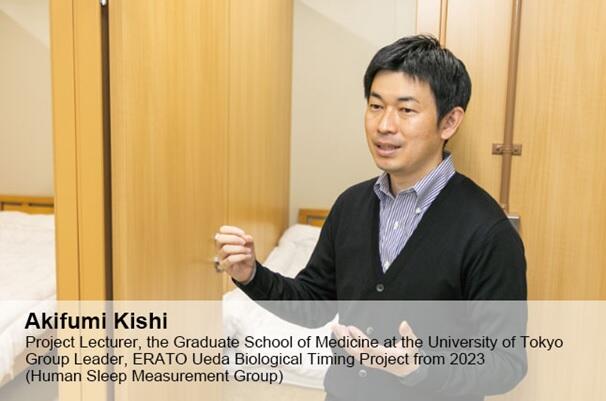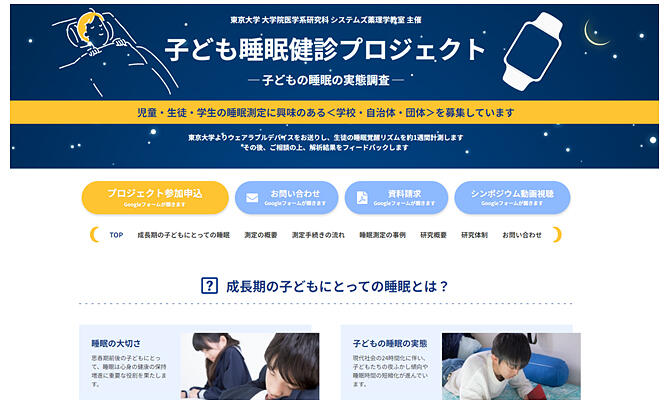Interest in sleep research has increased in recent years. The ERATO 'Ueda Biological Timing Project,' launched in October 2020, involves three sleep-research groups as well as the 'Children Sleep Checkup Project,' which analyzes and proposes guidelines for healthy sleep in children. JST News interviewed four individuals about the current state and future prospects of sleep research: Professor Hiroki Ueda of the Graduate School of Medicine at the University of Tokyo, who oversees the research (Research Director of the Project), Visiting Researcher Rikuhiro Yamada at the RIKEN Center for Biosystems Dynamics Research (RIKEN BDR), and Lecturer Koji L. Ode and Project Lecturer Akifumi Kishi of the Graduate School of Medicine at the University of Tokyo.
Japanese people have little time to sleep from childhood: Conducting the 'Children Sleep Checkup Project'

Creation of a sleep landscape — Adult sleep patterns classified into 16 types
At first glance, nothing seems to be happening during sleep, but in reality, brain waves fluctuate greatly, and cycles of non-REM and REM sleep occur spontaneously. "Sleep remains a mystery and a fascinating research subject," said Project Lecturer Akifumi Kishi of the Graduate School of Medicine at the University of Tokyo, who serves as Group Leader of the Human Sleep Measurement Group.
During his high school years, Kishi devoted himself to soccer, where he was challenged to find time to study and improve his learning efficiency while still engaging in hard practice sessions. This experience naturally led him to develop an interest in physiological topics, such as fatigue and sleep, and he majored in physical education at the Faculty of Education at the University of Tokyo. He engaged in research involving the human body and brain mechanisms. He joined the Project in 2022, taking the baton from Project Associate Professor Yoichi Minami of the Graduate School of Medicine at the University of Tokyo, who was the second leader of the Project, to start research on children's sleep.
The Human Sleep Measurement Group has already achieved two significant fundamental technological results. One involves the development of a high-precision machine-learning algorithm 'ACCEL,' and the other entails the creation of a 'human sleep landscape' using this algorithm. The latter is built upon a database of approximately 100,000 individuals in the UK who underwent measurements using the same accelerometer. The data were used to classify adult sleep into 16 different sleep patterns, including 'short sleepers' and 'long sleepers on weekends.' Sleep issues caused by various factors were visualized.
Figure: Children Sleep Checkup Project

Fundamental data is collected in the measurement room: The goal is to expand this Project to a nationwide scale
Applying these fundamental technologies, Kishi and Minami launched the 'Children Sleep Checkup Project' in September 2022 to measure and analyze children's sleep objectively. This is a large-scale project that involves distributing wristwatch-type wearable devices to students from elementary to junior-high and high schools across the country for data accumulation (see Figure). The Project has received applications from many schools all over Japan, and 1000 wearable devices are insufficient to fulfill the demands of the applicants.
At the end of the one-week measurement period, a feedback report summarizing the measurement results recorded on the collected devices is returned to the individual. After receiving the report, many people asked for a lecture on sleep. Consequently, Kishi visits schools five to six times a year to deliver lectures on sleep to students, teachers, and parents.
The Project's goal is to understand, foster, and protect children's sleep. Sleep abnormalities often precede various diseases. Therefore, identifying disruption in children's sleep during regular health checkups significantly increases the chances of early detection of these conditions, which include developmental disorders and those affecting sleep. In terms of sleep duration, even during childhood, the Japanese population ranks at the bottom among OECD countries. "Children's sleep duration is significantly influenced by their parents. Considering the diligent nature of our nation, it is crucial to approach this issue by improving sleep from childhood," said Kishi.
In parallel with this Project, Kishi is also collecting fundamental sleep data from children in a dedicated sleep measurement room set up within a research facility at the University of Tokyo. Children's sleep is characterized by deep sleep, during which substantial amounts of growth hormones are secreted, and their bodies frequently move during sleep. Every weekend, elementary, junior-high, and high school students are invited to participate in an overnight experiment within the measurement room to collect fundamental data that will be used to develop a sleep algorithm for children. "The number of applicants is increasing, with some children even applying to participate in this experiment from as far away as Hokkaido and Kyushu."
Kishi has stated that his immediate goal is to expand the Children Sleep Checkup Project to a nationwide scale. Moreover, he aims to create a 'children's sleep landscape' based on the collected data. Collaborating with other Groups, he strives to unravel the relationship between sleep and various diseases.
(Article: Naoko Yoshimoto, Photography: Seiko Kusu)




